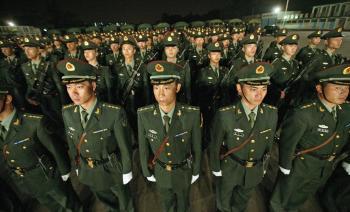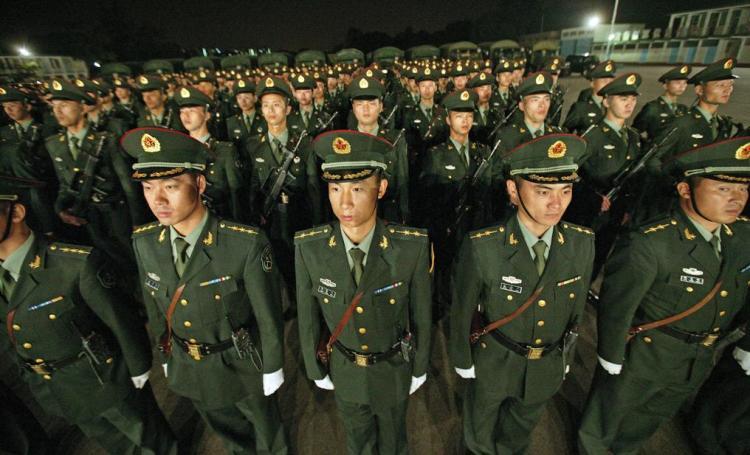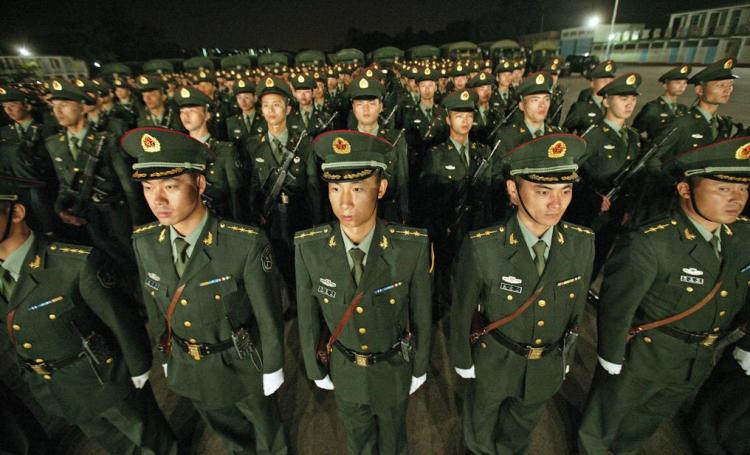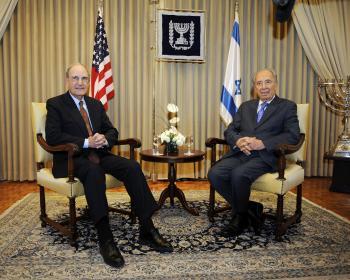In recent years, China has become a powerful nation from an economy that has grown at breakneck speeds. It seems as if the communist-controlled state is taking its place as a superpower. This growth has led to a situation where the U.S. and China have become centers of power in the world. But surprisingly, despite big differences between the two states, one democratic and the other communist, the two have learned to identify their common interests and work in relative cooperation.
This cooperation started back in the 1970, when former President Richard Nixon and former Secretary of State Henry Kissinger decided to buddy up with China, supposedly against the USSR, with the philosophy of “my enemy’s enemy is my friend,” or “Realpolitik.”
Since that time China has gained a special kind of status in the United States. It has become an exception to any difference of principles or morals. Facing any other country, America would fight for human rights, infringement of its patents, and trade secrets. For example, two other communist states, Cuba and North Korea, get a tough time from the U.S. for these types of issues as a matter of course. Not China.
After the fall of the Soviet Union, even though the reason for this special treatment ceased to exist, the power of good relations with world’s most populous nation stayed on.
In an interview with The Epoch Times, China scholar Jonathan Story, explained the mutually beneficial relationship between the two nations.
“Deng Xiaoping [head of the communist regime in China during the 80’s and early 90’s] pointed to the fact that China needed stability in the international arena to continue to develop itself and become more modern. The only country that could have provided such a stable environment was the U.S.
“On the other hand, there is a parallel policy in the U.S. that regards China as a central stabilizing force in Asia,” said Story, Professor Emeritus for political economy at INSEAD, the renowned international business school in France. Story just finished writing a 700-pages book on China for the Financial Times.
The cooperation between Chinese Communist Party (CCP) and the U.S. government was primarily economic. In the early 90’s, the CCP made a significant devaluation of its currency and made itself the factory of the world, and specifically the United States.
Ethan Gutmann, who has written on business and rights in China, told The Epoch Times, “The relationship between China and the United States can be characterized as short-term cooperative and long-term competitive... China, because of its ambition to be the pre-eminent superpower, and the necessity of hewing to a ‘peaceful rise’ stage—until their economy achieves full parity with the United States.”
Meanwhile, the Chinese regime has consistently supported, directly and indirectly, almost any factor that positions itself as anti-American. Unlike, many politicians in the U.S. who hope to build a long-term cooperation with China, the heads of the regime in China always see cooperation as a first step to enable building power, but inevitably leading to a conflict with the U.S.
Gutmann added, “The Chinese defense budget has increased by double digits every year for well over a decade. As Chinese investment in naval technology, even aircraft carriers demonstrates, they will have the cash—and perhaps most important, the belief—that they can fight a war at several different levels in the near future.”
“In the medium term, the problem is still one of perception and crisis instability—Chinese military leaders will think they have an advantage, even if they don’t; will think they have to fire first, even if they will ultimately lose,” Gutmann said.
Concurrently, in the 90’s, the Clinton administration opened many barriers with China, allowed American companies to produce in China and sell weapons and technology to the Chinese armed forces. The administration also enabled its entrance into the World Trade Organization. At that time the seeds of today’s economy were planted. The CCP supplied cheap labor and the U.S. provided voracious consumers, leaving the U.S. today with an enormous $100 billion trade surplus to China.
This high tide enabled the U.S. government and the CCP to overlook central issues of controversy between them. The U.S. displayed uncharacteristic tolerance to the support the CCP provides regimes in the Sudan, Burma, and Iran. Also, the U.S. refrained from criticizing too severely the human rights situation in China. The CCP managed to maintain an “open to the West” facade and learned to distance its repression away from the eye of Western media.
All the more so, with the Bush administration’s War on Terror, the temptation to let the home front continue to flourish economically without taking up any grievances with the CCP became the only way forward.
Reality is Changing
But over the past year, the economic crisis the world is going through is changing this delicate balance of powers. The explosion of the credit bubble reduces the dependence of the U.S. on China.
Itay Slonim, an Epoch Times economic commentator explained: “The relationship has changed because of the crisis. In the past, China financed the American consumption ‘party’ and America feared that a conflict between the two countries would lead to China selling the U.S. government bonds it is holding and that would lead to a rise in interest rates in the U.S. and the explosion of the consumption bubble.“But the bubble has exploded even though China continued printing money and financing the U.S. The banks and bond holders just wouldn’t lend anymore.
“Nowadays, the U.S. is far less dependent on China and the world at large. Actually, in recent months there has been a sharp decrease in U.S. government bonds being bought by China and by other countries like Russia, Brazil, and OPEC countries, all of which are facing a crisis of their own, and the U.S. is financing itself by printing money.
”Currently, the Chinese regime still artificially fixes the exchange rate of its currency and this hurts the U.S. and other Western nations’ industries. It seems like Obama is much more determined to deal with this issue. The fact that the U.S. is far less dependent on China can certainly induce him to act upon it,” said Slonim.
Prof. Story elaborated: “China today is in a very vulnerable state, since the current Congress, ruled by the democrats, does not support unconditional free trade. I can easily imagine a coalition against China in Congress with ease, if China were to do things that would threaten the Americans like: play with the exchange rate of the Yuan, support Iran, have a huge surplus in its balance sheet or harm human rights. From this perspective, Geithner’s [Secretary of Treasury] latest statement regarding the exchange rate manipulation by the Chinese regime is a warning to the Chinese.”
“Everything that we have seen over the past 20 years, the world’s economic boom, everything we have gotten used to: cooperation between the U.S. and China, China entering the WTO, and growth in global markets, all these things grew on Wall Street’s, London’s and Hong Kong’s financial bubbles. ‘What can we expect now?’ is a question worth asking. It would be much more difficult to create a stable interior policy in the short term,” said Story.
Too Forgiving an Attitude
Gutmann, however, fears that Obama is not clear enough on the cunning of the Chinese regime: “Simply saying ‘to those who cling to power through corruption and deceit and the silencing of dissent,’ that ‘you are on the wrong side of history’ is not enough. That theory was interesting back in the mid-90s when it was assumed that capitalism would change the [Chinese Communist] Party, not that the Party would change capitalism. The passive, feel-good view of Chinese incremental change—this view is no longer tethered to reality. The tenuous incremental advances of Chinese democracy, of Chinese values and morality, all of these things have stalled, even reversed.”
Gutmann said he thinks that Obama should adopt a stronger stance towards the Chinese regime: “History, at times, must be forced. Elections will not be held unless the Party feels it has no other choice. The organ harvesting of Falun Gong and Christians will not end unless it costs the Party more—in lost business contracts, or in reputation—than the profits they are currently making through this genocidal, barbaric practice. So that is what concerns me about the first, early signs of the Obama presidency towards China.”Ties With Questionable Regimes
Another point that could become a dispute between the U.S. government and the CCP, is the CCP’s ties with other totalitarian regimes. On the one hand the U.S. tries to limit the Chinese regime’s support of hostile factors. But the Chinese regime might flex its muscles too.
Prof. Story relates to the case of Sudan as an example: “Sudan is actually a colony of China, 80 percent of Sudanese oil is exported to China, and China is heavily involved in infrastructure work in Sudan. When the Olympic games were nearing, China was criticized as a supporter of the oppressive government in Sudan. Since that time, there is also much criticism from China towards the U.S. They claim: ‘We can be in touch with whoever we want, we put a lot of money in your bonds but you devalued your Dollar, stop criticizing us.”The possible point of serious contention between the two governments, according to Story, would be Iran: “Regarding Iran… it is a central issue for him, even before Israel. China would be tested in this regard, and it may cause a rather big dispute. It seems that as the crisis is getting worse, the balance of powers between the regime in China and the U.S. could make it worse and Obama’s challenge would be greater.”





